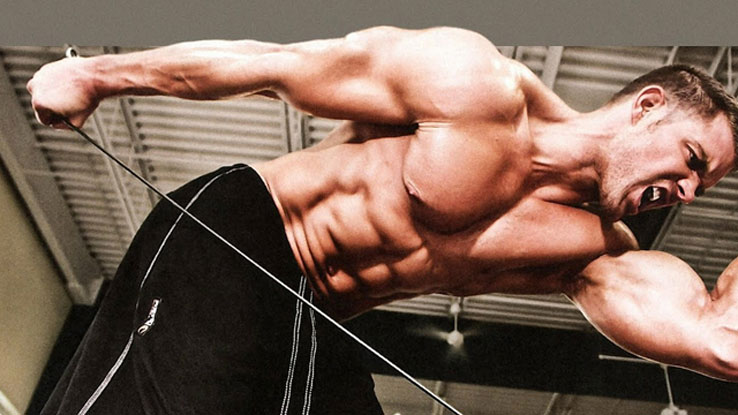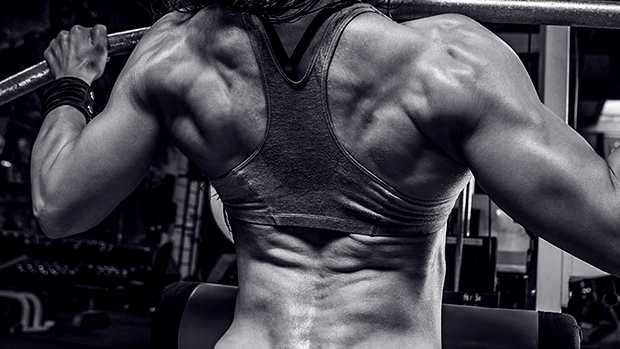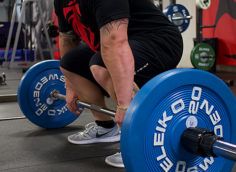Some lifters seek size at any cost. They couldn't care less if their joints take a beating in the process. To them it's bodybuilding "carpe diem" – seize the day and screw tomorrow!
Guys with a few more grey hairs in their beards tend to take a different approach. Years of balls-out training have taken their toll, forcing them, kicking and screaming, to make joint health a priority. For these guys, a day without aches is as fulfilling as a new PR.
Fortunately, there's a way to accomplish both objectives with one training method. It's called supersets.
Supersets involve pairing two exercises and moving from one to the next with little to no rest in between. This training method can be very effective because short rest intervals increase lactate production and decrease blood pH, which triggers the anterior pituitary to secrete growth hormone.
Lactate can also stimulate Testosterone release from testicular Leydig cells. By increasing anabolic hormone production in this manner, supersets (and the subsequent "burn" they induce) can promote some serious muscle growth and keep you lean in the process.
Supersets also increase the density of training, another variable that can significantly boost muscle hypertrophy and improve body composition. In his book Arnold: The Education of a Bodybuilder, Schwarzenegger explains how many advanced bodybuilders in Germany would use supersets to save time (i.e., do the same amount of work in less time). "What you'll be doing [with supersets] is building your body to its ultimate size and training it for maximum definition," says the Oak. While I wouldn't ask Arnold how to land a hot mistress, I would definitely take his training advice!
It gets better. Play your cards right and supersets can even increase strength, improve joint health and integrity, and promote left-right symmetry. Oh yeah, and build muscle! Now I'll show you how.
The Look-Better-In-A-Shirt Superset Routine
The elbow flexors (biceps brachii, brachioradialis and brachialis) are innervated by the musculocutaneous nerve (C5 and C6), and the elbow extensors (triceps brachii and anconeus) are innervated predominantly by the radial nerve (C6, C7 and C8). If these vertebrae are out of alignment, strength will be affected.
In the book Optimal Muscle Training, Dr. Ken Kinakin reveals that nerve compression of merely 10-50 mmHg (about the weight of a dime on the back of your hand) from the spine to the muscles can potentially decrease action potentials by up to 40%. Activating the long cervical extensors and upper traps with neck bridges and shoulder shrugs, respectively, can help reposition these often-misaligned vertebrae and increase strength, instantly. I talk about this in greater detail in my article Get Ready For The Workout Of Your Life!
With that in mind, here's a superset routine that will fill out your sleeves and neckline in no time:
| Exercise | Sets | Reps | Tempo | Rest | |
| A1 | Neck Bridge (isometric hold) | 4 | 1 min. | 10 sec. | |
| Use an appropriate level of resistance. Most trainees can perform this exercise on a Swiss ball using body weight only; some advanced lifters can use additional weight held on their chest, while many beginners will have to start with the back of their head leaning against a wall. You must hold a static position for 30-60 seconds before reaching muscular failure. If you can't maintain the isometric contraction for a minimum of 30 seconds, then the level of resistance is too high. Conversely, if 60 seconds is easy, then the level of resistance is too low. Proceed immediately to the close-grip bench press after the neck bridge. It should take you roughly 10 seconds to get in position and begin. |
|||||
| A2 | Close-Grip Bench Press | 4 | 8-10 | 4010 | 2 min. |
| B1 | Seated Dumbbell Shrug | 4 | 10-12 | 1012 | 10 sec. |
| Hold the top (contracted) position for 2 seconds | |||||
| B2 | Seated Zottman Curl | 4 | 8-10 | 4010 | 2 min. |
| C1 | Standing Twisting Rope Curl | 3 | 10-12 | 3010 | 10 sec. |
| C2 | Flat Twisting Dumbbell Triceps Extension | 3 | 10-12 | 3010 | 90 sec. |
| D1 | Seated Dumbbell Concentration Curl | 3 | 10-12 | 3010 | 10 sec. |
| On the final pair of exercises, start with the weak side first. Let's assume your left side is weaker. Perform concentration curls with your left arm. Ten seconds after you finish, perform triceps kickbacks with your left arm. Ten seconds after you finish, perform concentration curls with your right arm. Ten seconds after you finish, perform triceps kickbacks with your right arm. Rest 90 seconds and repeat the process two more times. |
|||||
| D2 | One-Arm Dumbbell Triceps Kickback | 3 | 12-15 | 2010 | 90 sec. |
Notes
- For tempo, the first and third numbers indicate the amount of time it should take to perform the eccentric and concentric portions of the exercise, respectively. The second and fourth are the number of seconds you should pause after.
- Perform the routine once every 5 days.
Do 6 cycles of the above routine and after 30 days, you should notice considerable neck and arm hypertrophy – and your shirts should fit better, too!

The Unconventional Upper-Body Superset Scheme
Most conventional supersets pair agonists (same body parts) or antagonists (opposite body parts) for hypertrophy, or non-competing body parts (e.g., pairing an upper body with a lower body movement) for body composition purposes. However, you can also pair gross with specific movements, multi-joint (compound) with single-joint (isolation) movements, or prime movers with stabilizers.
The following superset routine will not only improve upper body size, strength, and performance, it will also promote shoulder health and integrity. Often, upper body supersets can create a muscular imbalance in the shoulder joint with excessive internal rotation and insufficient external rotation of the humerus, but not with this scheme.
Perform the following routine once every 5 days:
| Exercise | Sets | Reps | Tempo | Rest | |
| A1 | Wide-Grip Sternum Pull-up | 4 | 4-6 | 50X0 | 10 sec. |
|
If you're unable to perform the prescribed number, do as many as you can in good form and then continue with regular wide-grip pull-ups until all reps are completed. |
|||||
| A2 | Seated Dumbbell Muscle Snatch | 4 | 8-10 | 10X0 | 2 min. |
| B1 | Incline Bench Press | 4 | 6-8 | 40X0 | 10 sec. |
| B2 | ShoulderHorn Cable External Rotation | 4 | 10-12 | 3010 | 2 min. |
| The ShoulderHorn is great to use during the cable external rotation movement. However, if one isn't available, you can simulate the device by resting your upper arms on a preacher bench. |
|||||
| C1 | Standing Cable Crossover | 3 | 10-12 | 3010 | 10 sec. |
| C2 | Standing EZ-Bar Upright Row | 3 | 10-12 | 3010 | 90 sec. |
| Use a mid-grip (shoulder-width) hand position. If you're concerned with long-term shoulder health, I suggest avoiding a close-grip position on this exercise. |
|||||
| D1 | Flat Dumbbell Flye | 3 | 10-12 | 3010 | 10 sec. |
| Use a pronated grip (thumbs facing each other). | |||||
| D2 | Bent-over Dumbbell Lateral Raise | 3 | 12-15 | 2010 | 90 sec. |
| Use a supinated grip (thumbs facing away from each other). | |||||
The One-Side-At-A-Time Lower-Body Superset Plan
The beauty of supersets is that you can get more work done in a given period of time. By resting only 10 seconds instead of a minute or more between two exercises, you can squeeze another set in, thus supersetting is a great method to use for unilateral training.
Many people shy away from unilateral work because it takes twice as long, especially personal trainers who generally have 60 minutes or less to work with a client. You can overcome that problem with supersets – they allow you to perform exercises that don't pop up often in the rotation, and more importantly, they allow you to restore left-right symmetry that may have strayed with constant bilateral work.
There are two ways to do this:
- Perform both sides of the first exercise followed by both sides of the second exercise with only 10 seconds between each movement (basically, just enough time to get set for the next exercise) and then rest, or...
- Perform one side of the first exercise, followed by one side of the second exercise, followed by the other side of the first exercise, followed by the other side of the second exercise, with only 10 seconds between each movement and then rest.
Did you get that? If not, read it over again s-l-o-w-l-y!
Perform the following routine once every 5 days:
| Exercise | Sets | Reps | Tempo | Rest | |
| A1 | Front Split Squat | 3 | 6-8 | 3010 | 10 sec. |
| A2 | Single-Leg Hip Extension | 3 | 6-8 | 1012 | 2 min. |
| B1 | Back Step-Up | 3 | 10-12 | 1111 | 10 sec. |
| B2 | Seated Single-Leg Press | 3 | 15-20 | 1010 | 2 min. |
| If you don't have access to a leg press machine, substitute a one-leg (pistol) squat instead. | |||||
| C1 | Standing Leg Curl | 3 | 6-8 | 4010 | 10 sec. |
| C2 | Seated Single-Leg Extension | 3 | 12-15 | 2010 | 90 sec. |
| D1 | One-Leg Calf Raise | 3 | 10-12 | 2110 | 10 sec. |
| May be performed on a step with a dumbbell held on the same side as the working leg, or it may be performed on a dedicated standing calf raise machine if available. |
|||||
| D2 | Seated Single-Leg Calf Raise | 3 | 15-20 | 1010 | 90 sec. |
Whole-Body Muscle Mass Attack
Here's a superset routine that attacks the entire body! Unlike the whole-body routine that I presented in my 21st Century Supersets article, this is a split routine where the lower body is trained on Day 1 and the upper body on Day 2. Each day starts with proximal pairs and progresses distally with each subsequent pair. In other words, larger muscles are targeted first and smaller muscles toward the end of the workout.
The exercises are paired by joint in the following manner:
Day 1 - Lower Body
- A1. Trunk Extension
- A2. Trunk Flexion
- B1. Hip Extension
- B2. Hip Flexion
- C1. Knee Extension
- C2. Knee Flexion
- D1. Ankle Extension
- D2. Ankle Flexion
Day 2 - Upper Body
- A1. Shoulder Extension
- A2. Shoulder Flexion
- B1. Shoulder Horizontal Abduction
- B2. Shoulder Horizontal Adduction
- C1. Elbow Extension
- C2. Elbow Flexion
- D1. Wrist Extension
- D2. Wrist Flexion
Here's the routine now with the exercises and appropriate parameters in place:
Day 1 - Lower Body
| Exercise | Sets | Reps | Tempo | Rest | |
| A1 | Bent-Knee Deadlift | 4 | 6-8 | 31X0 | 10 sec. |
| A2 | Decline Sit-up | 4 | 8-10 | 20X0 | 2 min. |
| B1 | Reverse Hypers | 3 | 10-12 | 10X0 | 10 sec. |
| B2 | Incline Two-leg Lowering | 3 | 10-12 | 2010 | 90 sec. |
| C1 | Seated Leg Extension | 3 | 10-12 | 2010 | 10 sec. |
| C2 | Lying Leg Curl | 3 | 6-8 | 4010 | 90 sec. |
| D1 | Standing Calf Raise | 3 | 10-12 | 2010 | 10 sec. |
| D2 | Seated Cable Tibialis Raise | 3 | 15-20 | 1010 | 1 min. |
Day 2 - Upper Body
| Exercise | Sets | Reps | Tempo | Rest | |
| A1 | Mid-Grip Pull-up | 4 | 6-8 | 40X0 | 10 sec. |
| A2 | Standing Military Press | 4 | 6-8 | 40X0 | 2 min. |
| B1 | Seated Cable Row | 3 | 8-10 | 3010 | 10 sec. |
| B2 | Flat Neutral Dumbbell Press | 3 | 8-10 | 3010 | 90 sec. |
| C1 | Kneeling Rope French Press | 3 | 8-10 | 3010 | 10 sec. |
| C2 | Incline Dumbbell Curl | 3 | 8-10 | 3010 | 90 sec. |
| D1 | Cable Reverse-Grip Wrist Curl | 3 | 10-12 | 2010 | 10 sec. |
| D2 | Cable Wrist Curl | 3 | 10-12 | 2010 | 1 min. |
Notes
- Perform each day twice a week (e.g., Day 1 on Monday and Thursday, and Day 2 on Tuesday and Friday). After a month, switch to a new routine.
- Make sure to keep the rest minimal (only 10 seconds) between the first exercise and the second exercise of each superset pairing.
- Always think of the results, not your ego! The key with supersets is to be successful each set, not to use extremely heavy loads. Put your ego aside and pick an appropriate load to accomplish the task for every set. It's not uncommon to lose a rep or two each set depending on your fiber makeup, so adjust the load accordingly.
Let me put it in a way you might understand better. The chicks are checking out your body at the beach. They don't care how much weight you lift at the gym. Get it?
This article offers several unique methods for using supersets as part of your muscle-building and joint-restoring arsenal: three body-part schemes that you can combine to form a super potent routine, and a whole-body attack that's lethal on its own. Either way, get ready for some super results.



